
Aladdin is a Middle-Eastern folk tale. It is one of the best-known tales associated with One Thousand and One Nights, despite not being part of the original text; it was added by the Frenchman Antoine Galland, based on a folk tale that he heard from the Syrian storyteller Hanna Diyab.
Mahipal was an Indian actor who worked in bollywood mostly in stunt films like Parasmani, Zabak, Cobra Girl, Jantar Mantar, Arabian nights themed movies such as Alibaba and 40 Thieves, Aladdin Aur Jadui Chirag, Roop Lekha, Sunehari Nagin, Hindu mythological movies like Sampoorna Ramayan, Ganesh Mahima, Veer Bhimsen, Jai Santoshi Maa. He is known for playing the iconic role of Lord Vishnu, and his two avatars, Lord Rama and Lord Krishna in lot of various puranic, Ramayana, Mahabharata, Bhagavata Purana based movies, besides playing Tulsidas and Abhimanyu, and is also best known as the lead in V. Shantaram's Navrang (1959), and the songs "Tu Chhupi Hai Kahan Me Tadapta Yahan" and "baazigar me tu jaadugar". He acted in several well-known films of the 1950s and 1960s including V. Shantaram's Navrang (1959) and Babubhai Mistry's Parasmani (1963).
Babubhai Mistry was an Indian film director and special effects pioneer who is best known for his films based on Hindu mythology, such as Sampoorna Ramayana (1961), Mahabharat (1965), and Parasmani (1963) and Mahabharat

Alladin and the Wonderful Lamp, also known by its Telugu-language title Allauddin Adhbhuta Deepam, its Tamil-language title Allavudeenum Arputha Vilakkum, and its Hindi-language title Alladdin Ka Chirag, is a 1957 Indian fantasy film produced by M. L. Pathy on Jai Sakthi Pictures banner and directed by T. R. Raghunath. The film stars Akkineni Nageswara Rao, Anjali Devi. It is an adaptation of the story of Aladdin from One Thousand and One Nights and a trilingual, filmed simultaneously in three different languages. Allavudeenum Arputha Vilakkum was released on 29 March 1957, and Allavuddin Adbhuta Deepam followed on 13 April. Alladin Ka Chirag too, came in the same year.

Homi Wadia was an Indian film director and producer in Bollywood. He was the co-founder of Wadia Movietone productions, established in 1933 and later after the closure of Wadiatone, he founded Basant Pictures in 1942. In a career spanning five decades, he directed over 40 films, including Hunterwali (1935), Miss Frontier Mail (1936), Diamond Queen (1940), Shri Ram Bhakta Hanuman (1948) and fantasy film Hatim Tai (1956). He was also a founding member of the Film & Television Producers Guild of India, established in 1954. Homi Wadia was married to actress and stunt woman Fearless Nadia. Homi was the younger brother of JBH Wadia, who was himself a movie director.
Jamshed Boman Homi Wadia, commonly referred to as J. B. H. Wadia, was a prominent Bollywood movie director, screenwriter, producer and founder of Wadia Movietone Studio. He was born in prominent Parsi family which hailed from Surat, Gujarat whose ancestral business was ship building. Their family name of Wadia stands for master shipbuilders. In a family of entrepreneurs Wadia is credited with creation of movies involving populist stunt roles including those by Fearless Nadia and bringing concept of stunt actresses in Indian cinema.
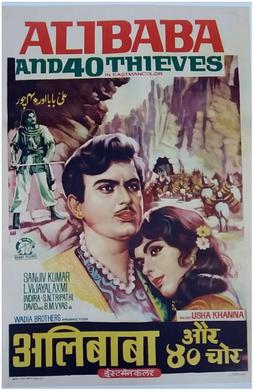
Alibaba Aur 40 Chor is 1966 Hindi adventure fantasy film produced and directed by Homi Wadia and starring Sanjeev Kumar in the lead role. The film is based on Ali Baba's story from One Thousand and One Nights.

11 O'Clock is a 1948 action film directed by Homi Wadia. It starred Fearless Nadia, John Cawas, Atish Sayani and Aftab. The Austin car, which was a regular in most Fearless Nadia films, was given a billing with the main cast as "Austin Ki Bacchi". The music was composed by Chitragupta. Homi Wadia had left Wadia Movietone, having parted ways with his brother JBH Wadia and started his own film company called Basant Pictures. He was to continue with the action genre, but produced more mythological films under this banner. His co-sponsor was M. B. Billimoria, who also distributed the film.
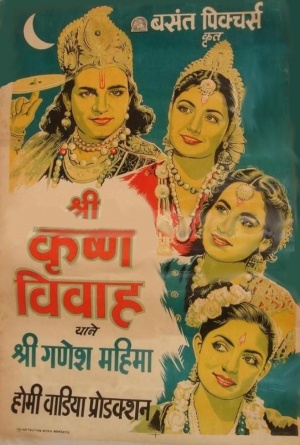
Shri Ganesh Mahima also called Shri Krishna Vivah is a 1950 Hindi mythological film directed by Homi Wadia. The film was made under Wadia's Basant Pictures Banner with music composed by S. N. Tripathi. Meena Kumari, after her career as a child artist, started doing adult roles as heroines in mythologicals and fantasy genres before she made it in mainstream cinema with Baiju Bawra (1952). The cast included Meena Kumari, Mahipal, S. N. Tripathi, Amarnath and Dalpat. It is a side story and indirect sequel to Hanuman Patal Vijay.
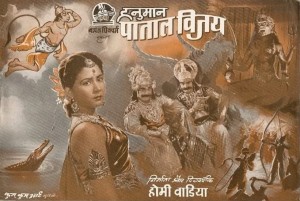
Hanuman Patal Vijay is a 1951 Hindi mythological film directed by Homi Wadia for his Basant Pictures banner. Meena Kumari starred in this devotional film with S. N. Tripathi playing Hanuman. Following her career as a child actress, Meena Kumari did heroine roles in mythologies made by Basant Pictures and directed by Homi Wadia. She had an extremely successful career for some years playing goddesses before her big commercial break in Baiju Bawra (1951). S. N. Tripathi, besides acting in the film, also composed the music. His costars were Meena Kumari, Mahipal, Niranjan Sharma, Dalpat and Amarnath.
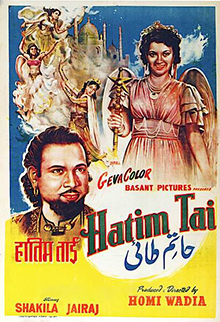
Hatim Tai is a 1956 Indian Hindustani language fantasy film directed by Homi Wadia for Basant Pictures. The story, script and scenario were by JBH Wadia, with dialogues by Hakim Latta and Chand Pandit. The film had several past favorites of Wadia Brothers credited in the film title role, such as Sardar Mansoor, Mithoo Miyan and Dalpat as actors and Boman Shroff as production manager. The cast included Shakila, P. Jairaj, Meenaxi, Naina, Krishna Kumari, S. N. Tripathi, B.M. Vyas and Sheikh.
Shri Ram Bhakta Hanuman is a 1948 Hindi religious film produced and directed by Homi Wadia for Basant Pictures. The story was adapted from Valmiki's Ramayana by Shivram Vashikar and the dialogues were written by P. C. Joshi. S. N. Tripathi not only provided music for the film but acted the main role of Hanuman. The film starred Trilok Kapoor, S. N. Tripathi, Sona Chatterjee, Niranjan Sharma and Prabhash Joshi.

Zimbo is a 1958 Hindi action adventure film directed by Homi Wadia and produced by Basant Pictures. John Cawas, the earlier hero of most Wadia Movietone adventure films is credited in the title role of the film as associate director, with special effects by Babubhai Mistry. The screenplay was by JBH Wadia with dialogues by Chand Pandit. The music was composed by Chitragupta, with lyrics by Majrooh Sultanpuri. The film starred Azad, Krishna Kumari, Chitra, Achala Sachdev, Sheikh and Dalpat.

Alibaba And 40 Thieves is a 1954 Hindi fantasy action film directed by Homi Wadia. The film was a Basant pictures presentation under the Wadia Brothers Production banner. The story, screenplay and additional dialogue were by J. B. H. Wadia, while the dialogues were written by Chand Pandit and Tahir Lucknavi. The art direction and special effects were by Babubhai Mistry. The music was composed by Chitragupta and S. N. Tripathi. Chitragupta had worked as an assistant to S. N. Tripathi in some of the mythology and fantasy films before branching out on his own. The lyricist was Raja Mehdi Ali Khan. It stars Mahipal, Shakila in the lead roles, with S. N. Tripathi, B. M. Vyas, Sharda, Lalita Kumari and Helen.

Zabak is a 1961 Hindi/Urdu action costume drama film produced and directed by Homi Wadia for his Basant Pictures under the Wadia Productions banner.

Char Dervesh is a 1964 Indian Hindi-language action fantasy film directed by Homi Wadia for Basant Pictures. The film was produced by Wadia Brothers and its music composer was G. S. Kohli. Feroz Khan acted in several "small-budget" costume films such as Homi Wadia's Char Dervesh as hero, before he became popular as second lead and later as hero, producer and director in mainstream cinema. The film was declared a hit. The film starred Feroz Khan, Sayeeda Khan, Naaz, B. M. Vyas, Mukri and Sunder.
Adventures of Aladdin is a 1978 adventure fantasy film produced and directed by Homi Wadia. This was the last film produced/directed by him. The film was a Basant Pictures production and starred Sachin, Nazneen, Jayshree T., Paintal, Raza Murad and Sudhir.
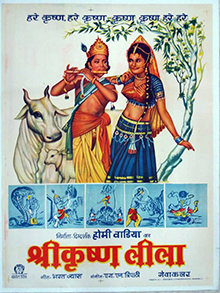
Shri Krishna Leela is a 1971 Hindi religious film directed by Homi Wadia. It was produced by his Basant Pictures banner. Written by B. M. Vyas, the story and dialogue were by S. N. Tripathi. The music was composed by S. N. Tripathi and had lyrics by B. M. Vyas. The film starred Sachin, Hina, Jayshree Gadkar, Sapru, Manhar Desai and Tabassum. The film was dubbed into Malayalam as Sree Krishnaleela.

Wadia Movietone was a noted Indian film production company and studio based in Mumbai, established in 1933 by Wadia brothers J. B. H. Wadia and Homi Wadia. It was most known for stunt, fantasy and mythological films, including Hunterwali (1935).
Shri Nath Tripathi was an Indian composer, whose active years were from the 1930s to the 1980s.














